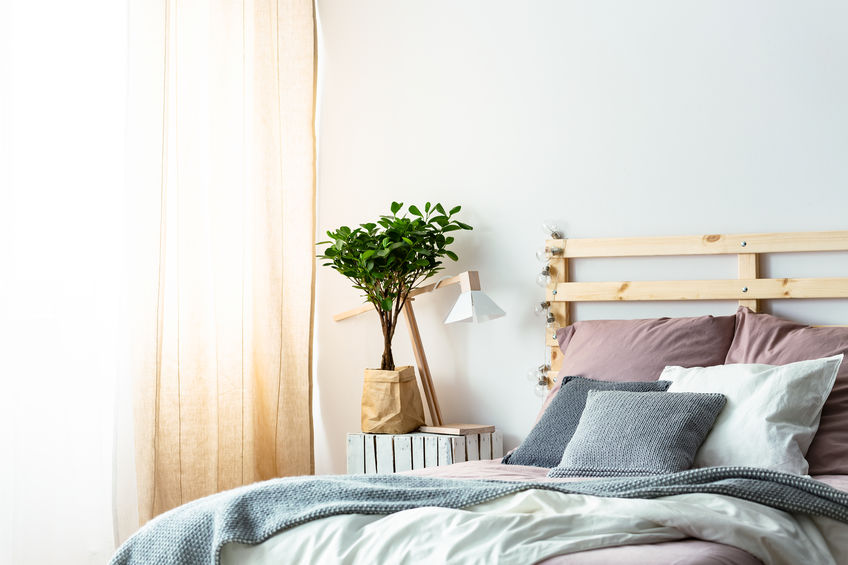Articles & Inspiration.
The Best Bedding for Eco-Conscious Green Singles
by Lewis Young

For Green Singles (and also green couples for that matter,) a sustainable and cruelty-free lifestyle is key motivator for how we live our lives. A green lifestyle touches on every point of interaction we have throughout our day; from using non-plastic coffee cups, wearing sustainable, cruelty-free clothing and sleeping in organic bedding. Yep, even the bedding you sleep on requires a conscious choice from you if you’re a true green single.
While living a more conscious lifestyle might require more energy from us for more awareness around our decision making, there are massive benefits to maintaining a ‘green’ lifestyle. Specifically speaking, sleeping in sustainable, organic materials has incredible benefits that not every green single knows about. These benefits aren’t just their impact on the world, either. They impact your physical health, too.
The Benefits of Organic Bedding Materials to Green Singles
Creature Comforts:
Firstly (and probably most importantly) is comfort. Organic materials are produced in a sustainable manner with extremely limited contact (if any) to unnatural chemicals during the production of the material and this allows for the naturally soft organic materials to maintain their comfortness.
This also allows for greater softness control by the bedding companies during their weaving process. We all want soft, comfortable bedding, right? So the focus for these companies is more often than not on making a comfortable sleeping experience for us, the sleepers!
Less Impact on the Environment:
As conscious singles, we want to lessen our impact on the environment. There aren’t many better ways for us to do this than using organic materials. The product, be it organic cotton, linen or other natural materials consumes less water, unnatural chemicals and non-organic during production, lessening the overall pollution we are having on the environment, and that’s the best we can ask for from our sheets, currently!
For example, moving away from normal cotton to organic cotton bedding removes the use of insecticides and pesticides that not only contaminate the cotton, but also the soil around then during the harvesting and production of the material. This removes impact on animals, insects and the planet, generally, whilst causing less harm to our own personal health, contributing to a better night’s sleep and a longer, healthier lifespan overall. So all-in-all, organic bedding is an absolute must for your own health as well as the planets.
A More Durable Sheet:
Organic materials, specifically organic cotton make for a more durable set of bedding. Without the treatment of unnatural chemicals and use of natural, softer fibers the bedding makes for the green singles perfect bedsheet material. The durability of this material has just as long, if not a longer lifespan than treated cotton bedding, when maintained and washed correctly.
Additionally, for the conscious green single, organic materials are biodegradable and better for the environment for a sustainability perspective.
The Types of Bedsheet Materials Perfect for Green Singles
When taking all of this into consideration, a sustainable and organic conscious single needs to ensure that their sleeping arrangements not only accommodate their lifestyle, but also their personal health. The key organic bedding types to suit these requirements are:
Organic Linen:
Linen is a super breathable material, great for the hotter summer nights and those who are like radiators during their sleep. Linen is an absorbent material which, combined with it’s light and airy properties will help us hotter green singles cool, dry and healthy sleepers.
Furthermore, organic linen is low impact fibre, but surprisingly, organic linen is incredibly hard to source and produce, making it an expensive product for.
The only real con of organic linen outside of its cost and sourceability would be that there are softer materials out there that will suit singles with more irritable skin. Otherwise, organic linen makes for a fantastic bedsheet.
Organic Cotton:
Arguably the best of all bedding materials, coined the ‘King’ of bedsheets. But what is a crime is that organic cotton in general only accounts for 1% of all cotton production worldwide. Organic cotton bedding accounts for 3% of all cotton bedding produced, too.
The benefits of organic cotton bedding to not only the environment, but to us as sleepers are massive. Organic cotton is the softest material around, which makes it the softest for sleeping. That softness makes it the perfect bedding material for those with sensitive skin. Organic cotton can reduce discomfort, irritation and aggravation for those sleeping with skin conditions such as eczema.
Organic Bamboo:
There is unfortunately a real misconception with regards to what organic bamboo is and how it is produced. In theory, bamboo would be the definition of ‘organic’. Bamboo never needs pesticides when being grown and is incredibly environmentally friendly during this process. It is unfortunate that during conversion into bamboo fiber and textiles, the production methods are incredibly chemically intensive.
The actual material used is Viscose Rayon, a material that uses bamboo fibers but not fully. Bamboo is a rough material, and so organic bamboo would be coarser than the actual viscose rayon. Furthermore, ‘organic bamboo’ takes twice as much energy to produce as opposed to organic cotton. The production process also uses carbon disulfide, which is a dispersant (meaning at least 50% of the element disperses into the air, contaminating it in the process).
The production of bamboo for bedsheets fits morally with all green singles and conscious people. Bamboo never needs pesticides, and organic bamboo bedding is made up 100% of bamboo with no unnatural added material or contaminated chemicals.
There is organic bamboo grove, however. But for this to constitute an ‘organic’ definition, it needs to fit extreme regulation requirements. For example, it would need to be grown on pure soil, use no pesticides and pure water… easier said than done. But if you can find bedding that uses organic bamboo grove (good luck), it’s worth the effort!
Recommended Next: Eco-Chic: Crafting Your Stylish, Sustainable Wedding

Lewis is an online writer with over 5 years’ experience writing within the fashion, sustainability, MuTech, manufacturing, legal and dating niches. He is currently starting his MA degree in Advertising Strategy and Planning and has traveled all over Europe in search of the best coffee known to man.
